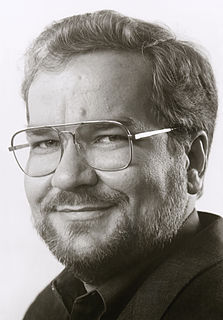Цитата Пола Вирилио
Что возьмет верх, так это желание уменьшить мир до такой степени, чтобы им можно было владеть. Все военные технологии сводят мир к нулю. И поскольку военные технологии являются передовыми технологиями, то, что они на самом деле рисуют сегодня, является будущим гражданской сферы.
Связанные цитаты
Если вы посмотрите на войну в Персидском заливе или новые военные технологии, они движутся в сторону кибервойн. Большинство видеотехнологий и технологий моделирования использовались для войны. Например, видео было создано после Второй мировой войны для радиоуправления самолетами и авианосцами. Так видео пришло с войной. Прошло двадцать лет, прежде чем он стал средством выражения для художников.
Технологии сначала оборудовали территориальное тело мостами, акведуками, железными дорогами, автомагистралями, аэропортами и т. д. Сейчас, когда самые мощные технологии становятся крошечными - микротехнологии, все технологии могут вторгаться в тело. Эти микромашины будут кормить тело. Исследования проводятся, например, для создания дополнительной памяти.
Реконструкция этой ракеты и переоснащение нашей армии будут усилиями 50 штатов. Каждое государство в союзе сможет принять участие в восстановлении наших вооруженных сил и развитии технологий завтрашнего дня. Другими словами, рабочие и рабочие места будут иметь место на всей территории Соединенных Штатов.
То, что происходит сейчас или должно произойти через одно-два поколения, — это распад мира. «Живые» технологии реального времени, киберреальность, позволят включить мир в себя. Можно будет прочитать весь мир, как во время войны в Персидском заливе. И я стану миром. Тело мира и мое тело будут одним целым.
Если у вас есть ограничения на выбросы углерода и система торговли, будет достигнуто соглашение об ограничении количества выбросов углерода. Это меняет экономическую картину для ископаемых и возобновляемых технологий. Это делает возобновляемые технологии более привлекательными, а ископаемые – менее привлекательными.
В частности, в случае с продуктами питания одна из технологий, которые могли бы помочь в этом, - генетические технологии, которые могли бы создавать более качественные культуры с более высокой урожайностью и меньшей потребностью в воде и удобрениях, - вызывает огромные опасения. Лишь немногие из этих опасений имеют научное обоснование.
Любой хороший учитель должен ознакомиться с соответствующими технологиями. Но технологии не должны диктовать цели образования. Скорее, учитель (или родитель, или ученик, или лицо, определяющее политику) должен спросить: могут ли технологии помочь в достижении этой цели и какие технологии, скорее всего, будут полезны?


































